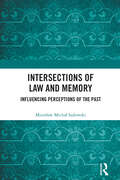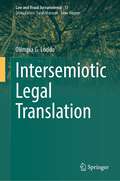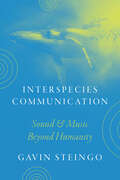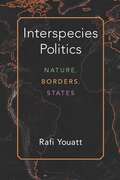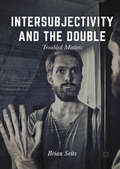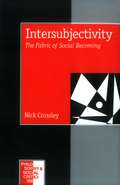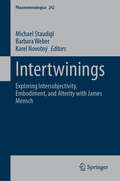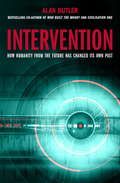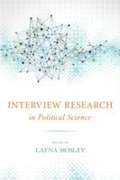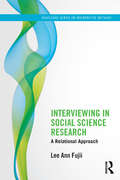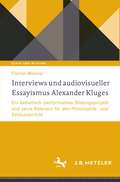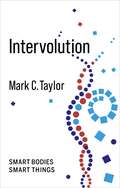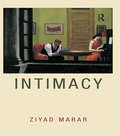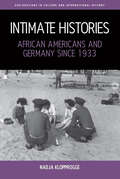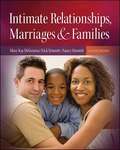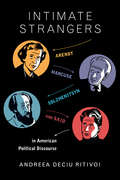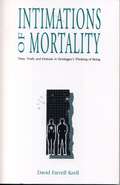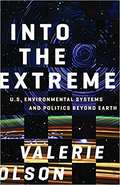- Table View
- List View
Intersections of Law and Memory: Influencing Perceptions of the Past
by Mirosław Michał SadowskiThis book elaborates a new framework for considering and understanding the relationship between law and memory.How can law influence collective memory? What are the mechanisms law employs to influence social perceptions of the past? And how successful is law in its attempts to rewrite narratives about the past? As the field of memory studies has grown, this book takes a step back from established transitional justice narratives, returning to the core sociological, philosophical and legal theoretical issues that underpin this field. The book then goes on to propose a new approach to the relationship between law and collective memory based on a conception of ‘legal institutions of memory’. It then elaborates the functioning of such institutions through a range of examples – taken from Japan, Iraq, Brazil, Portugal, Rwanda and Poland – that move from the work of international tribunals and truth commissions to more explicit memory legislation. The book concludes with a general assessment of the contemporary intersections of law and memory, and their legal institutionalisation.This book will be of interest to scholars with relevant interests in the sociology of law, legal theory and international law, as well as in sociology and politics.
Intersemiotic Legal Translation (Law and Visual Jurisprudence #11)
by Olimpia G. LoddoThe translation of legal documents in today’s globally interconnected world calls for novel approaches to overcoming traditional language barriers. The verbal language used in legal documents can be accompanied or even replaced by various types of semiotic resource, such as symbols, diagrams, and icons, while the advancement of digital tools and the introduction of new technologies offer those drafting contracts and other legal documents access to an ever-expanding toolbox for the translation process.This book makes a significant contribution to the existing literature on legal translation and intersemiotic translation by sharing valuable insights and opening up new avenues of inquiry, fostering further exploration of this evolving domain and enabling practitioners to use these diverse communication tools responsibly and effectively.Given the book’s structured multidisciplinary approach and extensive analyses of the characteristics of intersemiotic legal translation, its potential, and the complexities that arise at the intersection of law, language, and semiotics, it will appeal to legal practitioners, translators, semiotic scholars, and legal philosophers alike.Whether you are a legal professional aiming to expand your expertise, an academic seeking a new research direction, or are simply intrigued by the fascinating interplay of law, language, and semiotics, this book offers a valuable resource that sheds light on the unique dynamics of translating legal concepts using approaches other than traditional verbal communication. As such, it is an essential read for anyone who is interested in the changing landscape of law, language, and translation.
Interspecies Communication: Sound and Music beyond Humanity
by Gavin SteingoA surprising study reveals a plethora of attempts to communicate with non-humans in the modern era. In Interspecies Communication, music scholar Gavin Steingo examines significant cases of attempted communication beyond the human—cases in which the dualistic relationship of human to non-human is dramatically challenged. From singing whales to Sun Ra to searching for alien life, Steingo charts the many ways we have attempted to think about, and indeed to reach, beings that are very unlike ourselves. Steingo focuses on the second half of the twentieth century, when scientists developed new ways of listening to oceans and cosmic space—two realms previously inaccessible to the senses and to empirical investigation. As quintessential frontiers of the postwar period, the outer space of the cosmos and the inner space of oceans were conceptualized as parallel realities, laid bare by newly technologized “ears.” Deeply engaging, Interspecies Communication explores our attempts to cross the border between the human and non-human, to connect with non-humans in the depths of the oceans, the far reaches of the universe, or right under our own noses.
Interspecies Ethics
by Cynthia WillettInterspecies Ethics explores animals' vast capacity for agency, justice, solidarity, humor, and communication across species.
Interspecies Ethics
by Cynthia WillettInterspecies Ethics explores animals' vast capacity for agency, justice, solidarity, humor, and communication across species.
Interspecies Ethics
by Cynthia WillettInterspecies Ethics explores animals' vast capacity for agency, justice, solidarity, humor, and communication across species.
Interspecies Ethics (Critical Perspectives on Animals: Theory, Culture, Science, and Law)
by Cynthia WillettInterspecies Ethics explores animals' vast capacity for agency, justice, solidarity, humor, and communication across species. The social bonds diverse animals form provide a remarkable model for communitarian justice and cosmopolitan peace, challenging the human exceptionalism that drives modern moral theory. Situating biosocial ethics firmly within coevolutionary processes, this volume has profound implications for work in social and political thought, contemporary pragmatism, Africana thought, and continental philosophy.Interspecies Ethics develops a communitarian model for multispecies ethics, rebalancing the overemphasis on competition in the original Darwinian paradigm by drawing out and stressing the cooperationist aspects of evolutionary theory through mutual aid. The book's ethical vision offers an alternative to utilitarian, deontological, and virtue ethics, building its argument through rich anecdotes and clear explanations of recent scientific discoveries regarding animals and their agency. Geared toward a general as well as a philosophical audience, the text illuminates a variety of theories and contrasting approaches, tracing the contours of a postmoral ethics.
Interspecies Politics: Nature, Borders, States (Configurations: Critical Studies Of World Politics)
by Rafi YouattThis book explores the ways that international politics is a form of interspecies politics, one that involves the interactions, ideas, and practices of multiple species, both human and nonhuman, to generate differences and create commonalities. While we frequently think of having an international politics “of” the environment, a deep and thoroughgoing anthropocentrism guides our idea of what political life can be, which prevents us from thinking about a politics “with” the environment. This anthropocentric assumption about politics drives both ecological degradation and deep forms of interhuman injustice and hierarchy. Interspecies Politics challenges that assumption, arguing that a truly ecological account of interstate life requires us to think about politics as an activity that crosses species lines. It therefore explores a postanthropocentric account of international politics, focusing on a series of cases and interspecies practices in the American borderlands, ranging from the US-Mexico border in southern Texas, to Guantánamo Bay in Cuba, to Isle Royale, near the US-Canadian border. The book draws on international relations, environmental political theory, anthropology, and animal studies, to show how key international dimensions of states—sovereignty, territory, security, rights—are better understood as forms of interspecies assemblage that both generate new forms of multispecies inclusion, and structure forms of violence and hierarchy against human and nonhuman alike.
Intersubjectivity and the Double
by Brian SeitzThis book extends philosophy's engagement with the double beyond hierarchized binary oppositions. Brian Seitz explores the double as a necessary ontological condition or figure that gets represented, enacted, and performed repeatedly and in a myriad of configurations. Seitz suggests that the double in all of its forms is simultaneously philosophy's shadow, its nemesis, and the condition of its possibility. This book expands definitions and investigations of the double beyond the confines of philosophy, suggesting that the concept is at work in many other fields including politics, cultural narratives, literature, mythology, and psychology. Seitz approaches the double by means of a series of case studies and by engaging loosely in eidetic variation, a methodological maneuver borrowed from phenomenology. The book explores the ways in which wide-ranging instances of the double are connected by the dynamics of intersubjectivity.
Intersubjectivity: The Fabric of Social Becoming (Philosophy and Social Criticism series #4)
by Nick CrossleyThis clearly written and broad-ranging text introduces and explains the notion of intersubjectivity as a central concern of philosophy, sociology, psychology and politics. The main purpose of the book is to provide a coherent framework for this important concept against which the various and contrasting debates can be more clearly understood. Beyond this, Nick Crossley provides a critical discussion of intersubjectivity as an interdisciplinary concept to shed light on our understanding of selfhood, communication, citizenship, power and community. The author traces the contributions of many key thinkers engaged within the intersubjectivist tradition, including Husserl, Buber, Koj[gr]eve, Merleau-Ponty, Mead, Wittgenstein, Schutz and Habermas. Intersubjectivity is an important and accessible volume which promotes cooperation between various disciplines addressing shared concerns.
Intertwinings: Exploring Intersubjectivity, Embodiment, and Alterity with James Mensch (Phaenomenologica #242)
by Barbara Weber Michael Staudigl Karel NovotnýThis anthology offers a comprehensive introduction to the contemporary phenomenologist James R. Mensch, exploring his oeuvre and thought. Mensch's extensive body of work spans several decades, often concretely engaging with three intersecting conditions of dialogue: Alterity, Intersubjectivity, and Embodiment. By intertwining these concepts, Mensch exposes the ever-threatening soliloquy of modern reason, calling upon us to deconstruct the conflation of human freedom with sovereignty that figures at the core of Western political thought and practice. The contributors to this book pick up these themes and explore the fragility and potentiality of our conceptions of discourse, dialogue, and the political. Moreover, and in applying Mensch's idea of a post-foundational phenomenology, this anthology honors Mensch's expansive work, which spans key thinkers such as Husserl, Levinas, Merleau-Ponty, and Patočka, and delves into subjects ranging from perception and time to ethics and ecology. The volume is meant for students and researchers and explores these three interwoven conditions in various ways.
Intervention
by Alan ButlerMany people think that the concept of time travel is pure fantasy. Using sound mathematical and scientific arguments, Alan Butler demonstrates how many key events in the history of humankind show evidence of having been attended by humans from the future, who took actions that would steer the world in a particular direction.
Interview Research In Political Science
by Layna MosleyInterviews are a frequent and important part of empirical research in political science, but graduate programs rarely offer discipline-specific training in selecting interviewees, conducting interviews, and using the data thus collected. Interview Research in Political Science addresses this vital need, offering hard-won advice for both graduate students and faculty members. The contributors to this book have worked in a variety of field locations and settings and have interviewed a wide array of informants, from government officials to members of rebel movements and victims of wartime violence, from lobbyists and corporate executives to workers and trade unionists. The authors encourage scholars from all subfields of political science to use interviews in their research, and they provide a set of lessons and tools for doing so. The book addresses how to construct a sample of interviewees; how to collect and report interview data; and how to address ethical considerations and the Institutional Review Board process. Other chapters discuss how to link interview-based evidence with causal claims; how to use proxy interviews or an interpreter to improve access; and how to structure interview questions. A useful appendix contains examples of consent documents, semistructured interview prompts, and interview protocols. Contributors: Frank R. Baumgartner, The University of North Carolina at Chapel Hill; Matthew N. Beckmann, University of California, Irvine; Jeffrey M. Berry, Tufts University; Erik Bleich, Middlebury College; Sarah M. Brooks, The Ohio State University; Melani Cammett, Brown University; Lee Ann Fujii, University of Toronto; Mary Gallagher, University of Michigan; Richard L. Hall, University of Michigan; Marie Hojnacki, Pennsylvania State University; David C. Kimball, University of Missouri, St. Louis; Beth L. Leech, Rutgers, the State University of New Jersey; Julia F. Lynch, University of Pennsylvania; Cathie Jo Martin, Boston University; Lauren Maclean, Indiana University; Layna Mosley, The University of North Carolina at Chapel Hill; Robert Pekkanen, University of Washington; William Reno, Northwestern University; Reuel R. Rogers, Northwestern University
Interviewing in Social Science Research: A Relational Approach (Routledge Series on Interpretive Methods)
by Lee Ann FujiiWhat is interviewing and when is this method useful? What does it mean to select rather than sample interviewees? Once the researcher has found people to interview, how does she build a working relationship with her interviewees? What should the dynamics of talking and listening in interviews be? How do researchers begin to analyze the narrative data generated through interviews? Lee Ann Fujii explores the answers to these inquiries in Interviewing in Social Science Research, the latest entry in the Routledge Series on Interpretive Methods. This short, highly readable book explores an interpretive approach to interviewing for purposes of social science research. Using an interpretive methodology, the book examines interviewing as a relational enterprise. As a relational undertaking, interviewing is more akin to a two-way dialogue than a one-way interrogation. Fujii examines the methodological foundations for a relational approach to interviewing, while at the same time covering many of the practical nuts and bolts of relational interviewing. Examples come from the author’s experiences conducting interviews in Bosnia, Rwanda, and the United States, and from relevant literatures across a variety of social scientific disciplines. Appendices to the book contain specific tips and suggestions for relational interviewing in addition to interview excerpts that give readers a sense of how relational interviews unfold. This book will be of great value to graduate students and researchers from across the social sciences who are considering or planning to use interviews in their research, and can be easily used by academics for teaching courses or workshops in social science methods.
Interviews und audiovisueller Essayismus Alexander Kluges: Ein ästhetisch-performatives Bildungsprojekt und seine Relevanz für den Philosophie- und Ethikunterricht (Ethik und Bildung)
by Florian WobserDieser Band entwickelt eine "mediensensible" Fachdidaktik Philosophie/Ethik. In Bezug auf die Lebenswelt der Schüler*innen werden Unterhaltungen und Kunstfilme des Medienphilosophen Alexander Kluge auf dessen Web-TV dctp.tv für eine philosophisch-ethische Bildung wahrnehmbar und denkbar. Kluges audiovisuelle Clips werden als Unterrichtsmedien ernst genommen, ihre Bild- und Tonspur(en) didaktisch gewürdigt. Das Montieren diskursiver und präsentativer Elemente ermöglicht zugleich eine medienphilosophiedidaktische Propädeutik zugunsten des Umgangs mit anderen Web-Inhalten (etwa auf YouTube).
Intervolution: Smart Bodies Smart Things (No Limits)
by Mark C. TaylorWhere does my body begin? Where does it end? What is inside my body? What is outside? What is primary? What is secondary? What is natural? What is artificial?Science fiction has long imagined a future fusion of humanity with technology. Today, many of us—especially people with health issues such as autoimmune diseases—have functionally become hybrids connected to other machines and to other bodies. The combination of artificial intelligence with implants, transplants, prostheses, and genetic reprogramming is transforming medical research and treatment, and it is now also transforming what we thought was human nature.Mark C. Taylor identifies this process as “intervolution” and explores how it is weaving together smart things and smart bodies to create new forms of life. Our wired bodies are no longer freestanding individuals, but interconnected nodes in worldwide networks. Recognizing this transformation overturns deeply entrenched distinctions and oppositions between minds and bodies. Intervolution reveals that we are already cyborgs, integral cogs in what will become a superorganism of bodies and things.
Intimacy: Understanding The Subtle Power Of Human Connection
by Ziyad MararThe hope for intimacy lies deep within us all. That moment of feeling uniquely understood, the antidote to isolation, is what gives us value, validation and self-belief. But as Ziyad Marar shows in this fascinating and engaging study, intimacy is a tricky business. The prevalence of social media, for example, is a sign of our desire for human connection, yet is a symptom of how little we truly achieve it.Often confused with love, intimacy is in many ways more important. Marar's investigation and celebration of this elusive but profound human experience shows how intimacy is central to a life well lived. But how do we spot the real thing? Marar helpfully identifies a key set of ingredients - reciprocity, conspiracy, heightened emotion, kindness - that when brought together enable the strongest experiences of intimacy. Without these four characteristics in the mix we are experiencing something less, or something else.Drawing on a wide range of sources - from key thinkers, as well as telling examples from familiar films and novels - Marar illustrates the subtlety and intricacies of intimacy and shows how closely it is bound up with notions of trust, control, risk and our own insecurities.Intimacy, argues Marar, is a necessary component of a fulfilled life. Yet we should not take for granted that we know what it is and how to get it. A better understanding of this powerful experience and the many barriers to achieving it may just help us to brave the search for it. For anyone bold enough to do so, which should be all of us, Intimacy is required reading.
Intimate Histories: African Americans and Germany since 1933 (Explorations in Culture and International History #12)
by Nadja KlopproggeIntimate Histories focuses on intimate relations as sites of shared pasts connecting African American and German history in the years between 1933 and 1990. By tracing topics that include anti-miscegenation laws, forced sterilization, casual sexual encounters, marriage, and friendships, Intimate Histories broadens our understanding of African American–German relations during the so-called “century of extremes.”
Intimate Relationships, Marriages & Families, 8th Edition
by Nick Stinnett Mary Kay Degenova Nancy StinnettThis comprehensive introduction to marriage and the family combines the most current research base with an emphasis on family background and diversity. It presents a positive perspective on families and focuses on the importance of public and social policy in the lives of families.
Intimate Strangers
by Andreea Deciu RitivoiAndreea Deciu Ritivoi is professor of English at Carnegie Mellon University. Her research focuses on immigration, exile, political discourse, argumentation theory, and intellectual history. She is the author of Yesterday's Self: Nostalgia and the Immigrant Identity and Paul Ricoeur: Tradition and Innovation in Rhetorical Theory.
Intimate Strangers: Arendt, Marcuse, Solzhenitsyn, and Said in American Political Discourse
by Andreea Deciu RitivoiAndreea Deciu Ritivoi is professor of English at Carnegie Mellon University. Her research focuses on immigration, exile, political discourse, argumentation theory, and intellectual history. She is the author of Yesterday's Self: Nostalgia and the Immigrant Identity and Paul Ricoeur: Tradition and Innovation in Rhetorical Theory.
Intimate Strangers: Arendt, Marcuse, Solzhenitsyn, and Said in American Political Discourse
by Andreea Deciu RitivoiAndreea Deciu Ritivoi is professor of English at Carnegie Mellon University. Her research focuses on immigration, exile, political discourse, argumentation theory, and intellectual history. She is the author of Yesterday's Self: Nostalgia and the Immigrant Identity and Paul Ricoeur: Tradition and Innovation in Rhetorical Theory.
Intimate Strangers: Arendt, Marcuse, Solzhenitsyn, and Said in American Political Discourse
by Andreea RitivoiHannah Arendt, Herbert Marcuse, Alexander Solzhenitsyn, and Edward Said each steered major intellectual and political schools of thought in American political discourse after World War II, yet none of them was American, which proved crucial to their ways of arguing and reasoning both in and out of the American context. In an effort to convince their audiences they were American enough, these thinkers deployed deft rhetorical strategies that made their cosmopolitanism feel acceptable, inspiring radical new approaches to longstanding problems in American politics. Speaking like natives, they also exploited their foreignness to entice listeners to embrace alternative modes of thought. Intimate Strangers unpacks this "stranger ethos," a blend of detachment and involvement that manifested in the persona of a prophet for Solzhenitsyn, an impartial observer for Arendt, a mentor for Marcuse, and a victim for Said. Yet despite its many successes, the stranger ethos did alienate many audiences, and critics continue to dismiss these thinkers not for their positions but because of their foreign point of view. This book encourages readers to reject this kind of critical xenophobia, throwing support behind a political discourse that accounts for the ideals of citizens and noncitizens alike.
Intimations of Mortality: Time, Truth, and Finitude in Heidegger's Thinking of Being (G - Reference, Information and Interdisciplinary Subjects)
by David Farrell KrellHeidegger’s thinking has an underlying unity, this book argues, and has cogency for seemingly diverse domains of modern culture: philosophy and religion, aesthetics and literary criticism, intellectual history and social theory. “The theme of mortality—finite human existence—pervades Heidegger’s thought,” in the author’s words, “before, during, and after his magnum opus, Being and Times, published in 1927.” This theme is manifested in Heidegger’s work not “as funereal melodramatics or as despair and destructive nihilism” but rather “as a thinking within anxiety.” Four major subthemes in Heidegger’s thinking are explored in the book’s four parts: the fundamental ontology developed in Being and Time; the “lighting and clearing” of Being, understood as “unconcealment”; the history of philosophy—with emphasis on Heraclitus, Hegel, and Nietzsche—interpreted as the “destiny” of Being; and the poetics of Being, explicated as the “fundamental experience” of mortality. Neither an introduction nor a survey, this book is a close reading of a wide range of Heidegger’s books, lectures, and articles—including extensive material not yet translated into English—informed by the author’s conversations with Heidegger in 1974–76. Each of the four subthemes is treated critically. The aim of the book is to push its interrogations of Heidegger’s thought as far as possible, in order to help the reader toward an independent assessment of his work and to encourage novel, radically conceived approaches to traditional philosophical problems.
Into the Extreme: U.S. Environmental Systems and Politics beyond Earth
by Valerie OlsonThe first book-length, in-depth ethnography of U.S. human spaceflight What if outer space is not outside the human environment but, rather, defines it? This is the unusual starting point of Valerie Olson&’s Into the Extreme, revealing how outer space contributes to making what counts as the scope and scale of today&’s natural and social environments. With unprecedented access to spaceflight worksites ranging from astronaut training programs to life science labs and architecture studios, Olson examines how U.S. experts work within the solar system as the container of life and as a vast site for new forms of technical and political environmental control. Olson&’s book shifts our attention from space&’s political geography to its political ecology, showing how scientists, physicians, and engineers across North America collaborate to build the conceptual and nuts-and-bolts systems that connect Earth to a specifically ecosystemic cosmos. This cosmos is being redefined as a competitive space for potential economic resources, social relations, and political strategies. Showing how contemporary U.S. environmental power is bound up with the production of national technical and scientific access to outer space, Into the Extreme brings important new insights to our understanding of modern environmental history and politics. At a time when the boundaries of global ecologies and economies extend far below and above Earth&’s surface, Olson&’s new analytic frameworks help us understand how varieties of outlying spaces are known, made, and organized as kinds of environments—whether terrestrial or beyond.
